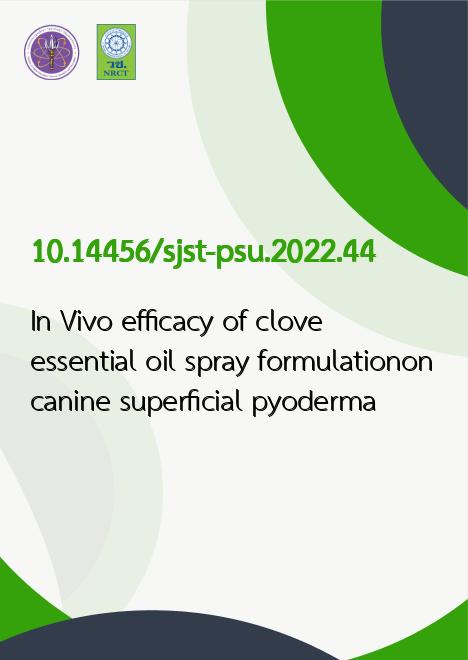
|
In Vivo efficacy of clove essential oil spray formulationon canine superficial pyoderma |
|---|---|
| รหัสดีโอไอ | |
| Creator | 1. Jareerat Aiemsaard 2. Kawintra Aiyaranoi 3. Eakachai Thongkham 4. Glenn Neville Borlace 5. Ketmanee Senaphan |
| Title | In Vivo efficacy of clove essential oil spray formulationon canine superficial pyoderma |
| Publisher | Research and Development Office, Prince of Songkla University |
| Publication Year | 2565 |
| Journal Title | Songklanakarin Journal of Science an Technology (SJST) |
| Journal Vol. | 44 |
| Journal No. | 2 |
| Page no. | 308-315 |
| Keyword | canine pyoderma, clinical trial, clove essential oil, spray, topical formulation |
| URL Website | https://rdo.psu.ac.th/sjst/index.php |
| ISSN | 0125-3395 |
| Abstract | Superficial pyoderma is a common skin disease caused by coagulase-positive staphylococci, especially Staphylococcuspseudintermedius and Staphylococcus aureus. The therapeutic use of antibiotics has many unwanted impacts, and the incidenceof drug-resistant strains is increasing. Therefore, the aims of this non-inferior randomized controlled trial were to determine theeffectiveness of 5% w/w clove essential oil lipid-based spray in treating superficial pyoderma in dogs, compared to 2% w/vchlorhexidine gluconate spray, and to evaluate the potential skin irritation of the clove oil spray formulation. The resultsdemonstrated that the therapeutic effect of the clove essential oil spray was non-inferior to chlorhexidine gluconate spray whenapplied topically 2 times a day for 15 days. The clinical lesion index scores of dogs treated with clove essential oil spray werereduced by 66.87% on day 10 and 83.73% on day 15 after initiating treatment, with no adverse effects. The skin irritation testshowed that clove essential oil spray did not induce erythema or edema at the tested sites. This report suggests that a lipid-basedclove essential oil spray formulation is a suitable alternative topical treatment for canine superficial pyoderma. |
